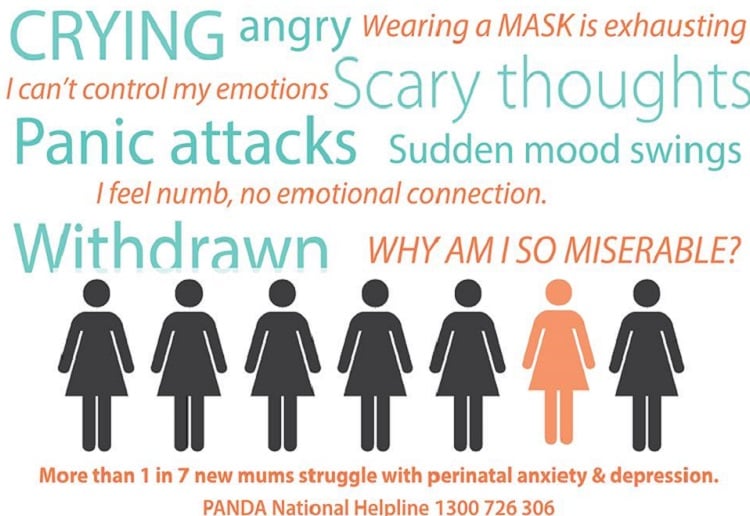Mum bravely shares her experience with post natal depression to help raise awareness to other women.
Laura Mazza, a mum-of-two from Victoria, told Daily Mail Australia that her realisation that she needed help came one night when her son wouldn’t stop crying.
‘I was rocking my son to sleep in the bassinet, I refused to pick him because I was told you shouldn’t do that, you should teach them to settle themselves.
‘As he started crying I was just rocking the bassinet harder and harder. I was shaking him, it wasn’t shaking him enough to hurt him yet, but it scared me.’
Ms Mazza said that this incident led her to seek help, both from family and friends and the Perinatal Anxiety and Depression Australia (PANDA).
Before this, the mum was so depressed she was scared to leave the house and having panic attacks.
‘I never wanted to leave the house, I was always scared of what might happen,’ she explained. ‘I would imagine crazy things, like that everyone was judging me or that someone would try and kidnap my baby.
‘I spent days at home with the blinds drawn, just sitting in the darkness.’
Ms Mazza, who has written openly about her depression on her blog Mum on the Run, said that once she asked for help everything started to get better.
‘I was scared about being judged as a parent, I was scared if I was honest someone would take away my child,’ she said.
‘But the best thing is to not be afraid, they’re not going to take away your child, they want you to have that great relationship with them.’
The mum has spoken out as PANDA released new information about the prevalence of perinatal and postnatal depression.
The organisation’s most recent study found that two in five women aren’t aware that perinatal depression was an illness, and almost 50 per cent of women didn’t know what symptoms to look for.
PANDA’s helpline also reports that 60 per cent of mothers feel like they’re not living up to their own expectations as a parent.
New research into perinatal depression and anxiety reveals alarming confusion in the community
New research has revealed vast gaps in the public’s understanding of perinatal anxiety and depression, which is preventing new mums and dads from seeking timely help, Perinatal Anxiety and Depression Australia (PANDA) says.
Figures released ahead of next week’s Perinatal Depression and Anxiety (PNDA) Awareness Week (13-19 Nov) uncover that the Australian public believes there is little or no stigma attached to perinatal depression and anxiety – however, the perception of ‘what people think’ remains an enormous hurdle for new parents who are struggling.
Alarmingly, PANDA CEO Terri Smith said the figures suggesting a public acceptance of perinatal depression and anxiety are not reflected in the feelings of the majority of callers to PANDA’s National Helpline.
“The majority of callers report that they feel shame about their condition – a feeling that is compounded by the idea that they are not meeting their own expectations as a mother,” she said.
Annual data from PANDA’s National Helpline identifies that nearly 60% of callers are affected by the feeling of not meeting their own expectations as a parent.
The 2016 PANDA facts:
- Three in five people are not aware of perinatal anxiety as an illness and almost half do not know what signs to look for
- Anxiety is at least as common as depression during the perinatal period
- There has been an increase in understanding and compassion in the community with 80% of people believing perinatal depression and anxiety is not a sign of weakness
- 92% of people believe that perinatal depression and anxiety does not stop a woman from being a good mother
- Nearly 60% of callers report a lowered mood, with symptoms including hopelessness, lacking motivation and loss of joy, while over 65% report feeling anxious, panicked, agitated, angry and irritable
- Two out of five callers have not been diagnosed with a mental illness, meaning they have ‘slipped through the cracks’ in the system and have only received critical intervention and support via the PANDA Helpline.
Signs can include panic attacks, persistent, generalised worry, development of obsessive or compulsive behaviours, abrupt mood swings, feeling constantly tired, withdrawing from friends, difficulty focusing, feeling constantly sad or crying for no reason and having thoughts of death or suicide.
The free National Perinatal Anxiety and Depression Helpline can be reached on 1300 726 306, Monday-Friday 10am-5pm EST.
#bePNDAaware #PNDAawarenessweek
Share your comments below.
Image via PANDA Facebook




















-

-
-
mom81879 said
- 20 Apr 2017
-

-
-
mom101628 said
- 22 Dec 2016
-

-
-
BellaB said
- 15 Nov 2016
-

-
-
mom112217 said
- 15 Nov 2016
-

-
-
mom134803 said
- 15 Nov 2016

-

-
-
mom70876 said
- 14 Nov 2016
-

-
-
june11 said
- 14 Nov 2016
-

-
-
mom160421 said
- 14 Nov 2016
-

-
-
mom90758 said
- 14 Nov 2016
Post a comment5:45 pm
11:54 pm
7:28 pm
8:41 am
6:57 am
10:43 pm
10:02 pm
9:53 pm
9:31 pm
To post a review/comment please join us or login so we can allocate your points.